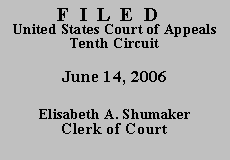

| UNITED STATES OF AMERICA,
Plaintiff-Appellee, |
|
| v. | |
| WILLIAM MICHAEL CAIN,
Defendant-Appellant. |
|
Defendant William Michael Cain pled guilty to a charge of possession of a firearm after a former felony conviction, in violation of 18 U.S.C. § 922(g). The district court sentenced Cain to 180 months' imprisonment after determining that his prior convictions supported an Armed Career Criminal Act (ACCA) enhancement under 18 U.S.C. § 924(e). On appeal, Cain argues that the district court's enhancement of his sentence under the ACCA violated his Fifth and Sixth Amendment rights. We exercise jurisdiction pursuant to 28 U.S.C. § 1291 and affirm Cain's sentence.
I.
On September 23, 2004, law enforcement officers from the Metro Fugitive Task Force arrested Cain in Moore, Oklahoma. Cain, who was wanted on an outstanding nine-count felony warrant, was ordered to get out of the vehicle he occupied as a passenger. Before Cain got out of the vehicle, officers observed that he bent down and placed something under his seat. The officers later recovered a .357 caliber Smith & Wesson revolver from the floorboard of the vehicle where Cain was sitting.
Cain pled guilty to a one-count indictment charging him with possession of a firearm after having been previously convicted of a felony. The presentence report recommended application of an enhanced penalty under the ACCA based on Cain's two prior convictions for second degree burglary and one prior conviction for use of a vehicle to facilitate the discharge of a firearm in conscious disregard of safety to others. Over Cain's objection, the district court concluded that these prior convictions qualified as violent felonies under the ACCA. The district court sentenced Cain to the statutory minimum of 180 months' imprisonment. II.
Cain argues that the district court violated the Fifth and Sixth Amendments when it enhanced his sentence under the ACCA based on his three prior felony convictions which were not charged in the indictment, nor proven to a jury beyond a reasonable doubt. Cain acknowledges that his argument is foreclosed under current Supreme Court and Tenth Circuit precedent, and thus, he raises the issue only to preserve it for possible Supreme Court review.
This court has held post-Booker(2) that the existence and classification of
prior convictions used to enhance a defendant's sentence need not be charged in
the indictment and submitted to a jury. See United States v. Moore, 401 F.3d
1220, 1224 (10th Cir. 2005) ("We are bound by existing precedent to hold that
the Almendarez-Torres(3) exception
to the rule announced in Apprendi(4)
and
extended to the Guidelines in Booker remains good law . . . . We therefore
conclude that the government need not charge the 'fact' of a prior conviction in
an indictment and submit it to a jury."); United States v. Small, 423 F.3d 1164,
1188 (10th Cir. 2005) (holding that the district court's career offender findings
under § 4B1.1 did not implicate the Sixth Amendment, and that "whether the
present offense and prior offense constitute felonies that are crimes of violence
or controlled substance offenses are questions of law unaffected by the Supreme
Court's holding in Booker"). Accordingly, we reject Cain's constitutional
challenge.
The sentence imposed by the district court is AFFIRMED.
Entered for the Court
Mary Beck Briscoe
Circuit Judge
*. This order and judgment is not binding precedent, except under the doctrines of law of the case, res judicata, and collateral estoppel. The court generally disfavors the citation of orders and judgments; nevertheless, an order and judgment may be cited under the terms and conditions of 10th Cir. R. 36.3.
2. United States v. Booker, 543 U.S. 220 (2005).
3. Almendarez-Torres v. United States, 523 U.S. 224 (1998).
4. Apprendi v. New Jersey, 530 U.S. 466 (2000).